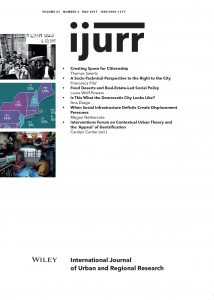This article analyses the creation of a normative framework for the democratic city during the regime change in Portugal in 1975—the answers that were given to the question, ‘What should a city be like in a democratic regime?’ While I critically discuss post-democracy and its use of post-foundational contributions, I review the post-revolution Portuguese constitutional debate, contending that the call for democratization brought by urban popular organizations was answered with a political compromise that exchanged expectations of a participatory city for a commitment to a social rights city, enhanced with a promise of homeownership for urban popular segments. In light of this, in this article I question post-democratic proposals, arguing that when this approach implicitly establishes equivalence between democracy and ‘the political’, it has difficulties in interpreting how the grammar of democracy is ‘organized’ in conflictual and contingent processes of democratic institutionalization. As an alternative, I contend that a critical debate concerning democracy and the urban must address how democratic expectations of emancipation have been translated into institutions and rights through interwoven and situated processes of politicization and depoliticization that allow both politicization of the urban and the production of consent.

